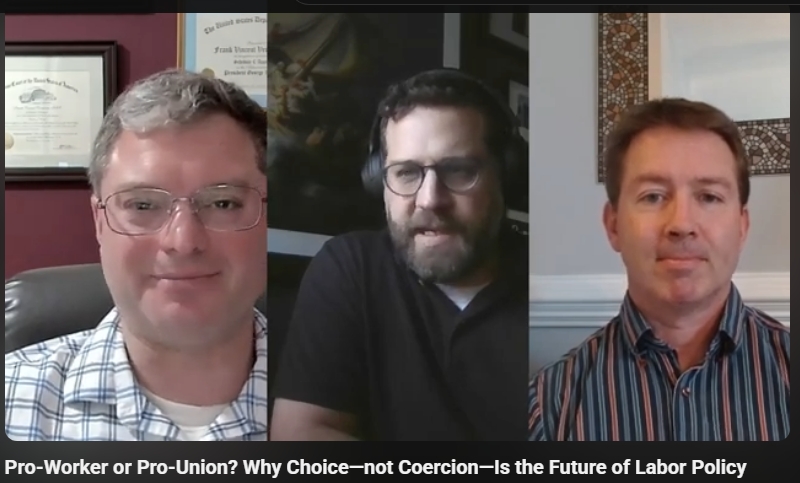Posts tagged Labor Reform
Op-ed: If the justices don’t reinforce their Janus ruling soon, unions will ignore it to death
January 20, 2026 // In the case of Janus, unions and their allies in the judiciary have grown increasingly brazen over the years in their contempt for the ruling. And yet the justices have steadfastly refused to revisit and give it teeth. And they’ve had plenty of chances. Between 2018 and 2023, more than 70 Janus-related cases were appealed to the Supreme Court, and there have been more since. Not one has been accepted for oral argument, let alone decided in the plaintiff’s favor.

Pro-Worker or Pro-Union? Why Choice—not Coercion—Is the Future of Labor Policy, Disunion: The Government Union Report; Commonwealth Foundation
December 18, 2025 // This week on Disunion, host David Osborne is joined by Austen Bannan of Americans for Prosperity and Vincent Vernuccio, president of the Institute for the American Worker, to break down a sweeping new report: How to Empower Workers: Embracing a Pro-Worker Agenda Built on Choice. With Congress rolling out a flurry of labor bills—from right-to-work reforms and secret ballot protections to proposals backed by unions and even some Republicans—this episode cuts through the noise. The panel explains why many so-called “pro-worker” policies actually empower union bosses and government regulators, not workers themselves.
Labor Unions Are Chipping Away at Worker Freedoms One Bill at a Time
October 14, 2025 // The so-called Faster Labor Contracts Act is one of the first steps in this new tactical departure. The legislation would force employers to begin bargaining with a new union in just ten days. If the two parties don’t reach an agreement in 90 days, the government forces mediation. One month after that, the matter goes to binding arbitration, meaning an outside arbitrator will dictate wages, benefits, and workplace rules for years to come. That’s not worker freedom. It’s top-down federal control. Americans recognize proposals like this for what they are: a Washington power grab. A U.S. Chamber of Commerce survey released just two weeks ago found that 90% of voters oppose government-mandated union contracts without worker approval.

Teamsters president notes ‘positive change’ with growing Republican union support in Senate testimony
October 9, 2025 // Rachel Greszler, senior research fellow at The Heritage Foundation, said the complexity of collective bargaining agreements means that both workers forming a union and the employer need ample time to consider their implications for the future of the company and its workforce. "When you have a first contract, especially if you have a company that has never been involved in negotiations or a union, that it's the first time that they're representing workers, they need to understand all the issues," she explained. She also said contracts like the United Auto Workers union's agreements with automakers such as Ford can run thousands of pages when accounting for memorandums of agreement, with several hundred items covered under the bargaining agreement.
Commentary: Putting Liberty at the Heart of Labor Policy
September 2, 2025 // High levels of unionization could be a good thing for the state. But the state needs better unions. When unionization is based on coercion and force rather than voluntary association, unions don’t need the support of their members. They can engage in political activity regardless of what their own members believe. They negotiate contract terms based on ideology rather than in the interests of their members. The ongoing corruption scandals at major unions also show that they continue to steal from their own members. There is a better way. That’s why we advocate for 21st Century Unionization, where labor policy is based on the freedom of association.

Two Freedom Foundation-Backed Bills Pass Arkansas State Legislature, Await Governor’s Signature
April 15, 2025 // HB1724 will work to improve local schools and strengthen communities rather than allowing union influence to control the election cycle, and SB402 will protect Arkansas educators and public employees from high-pressure union organizing activities during the school day. Both bills represent a critical implementation of new boundaries, which will encourage responsible taxpayer spending and a more accountable system for unions to abide by, preventing the left-wing union agenda from continuing to be inappropriately pushed into Arkansas schools.

Florida Continues to Lead the Nation on Labor Reform and Worker Freedom
December 10, 2024 // In 2023, Gov. DeSantis led the effort on a transparency bill (SB 256), otherwise known as the Teachers’ Bill of Rights. Our organization, Workers for Opportunity, was proud to help support this legislation through testimony before the Florida Legislature, newspaper essays helping explain the legislation and other advocacy efforts. We also utilized educational materials provided by The James Madison Institute.

OPINION Why don’t unions have to stand for reelection?
September 16, 2024 // The federal Bureau of Labor Statistics reports that 7.4 million workers in the private sector belonged to labor unions in 2023. Yet according to a new study from the Institute for the American Worker, which promotes market-oriented labor reform, fewer than 400,000 of those unionized employees — about 5 percent — have ever voted in an election for the union that represents them. Like me, the vast majority of employees in unionized workplaces were hired after the union had already been voted in. Most unions have never been required to confirm that they have the support of current workers by winning a recertification election. In some workplaces, a lifetime has elapsed — that isn’t hyperbole — since the union was first certified. The United Auto Workers organized General Motors’ Michigan plants in 1937 and has represented the employees who work there ever since. Never once has it had to stand for reelection. What kind of “workplace democracy” is that?
Key labor bills move forward in Louisiana
May 17, 2024 // Passed the House and sent to the Senate Committee on Labor and Industrial Relations: HB 956 aims to ensure the integrity of the voting process within labor organizations, potentially impacting how unions conduct internal elections. HB 523 would require a secret ballot election every two years to certify the collective bargaining representative. Passed the House and failed in the Senate Committee on Labor and Industrial Relations: HB 571 focuses on restricting certain designated labor organization activities within employment contracts. It aims to curtail practices such as paid release time for public employees to engage in union activities. HB 980 (previously 712) is focused on the resignation process from labor organizations for teachers and other school employees, along with regulations concerning the collection of membership dues for political activities.

The Battle for Worker Freedom in the States: Grading State Public Sector Labor Laws
September 30, 2022 // In the four years following the Janus v. AFSCME U.S. Supreme Court ruling, the nation’s four largest government unions—AFSCME, SEIU, NEA, and AFT—have lost almost 219,000 union members. The Janus decision to end forced unionism for government workers accelerated a long-term decline in membership. In response, government unions are conducting aggressive campaigns to unionize new workers with recent successes in Virginia and Colorado.
